Iranian opposition-in-exile publishes „Mahsa Charter“ and China brokers Saudi-Iran deal- signals towards Washington?
Breaking News in Tehran Times:
“By Mehran Shamsuddin
Iran, Saudi Arabia agree to restore diplomatic ties
March 10, 2023 – 15:37
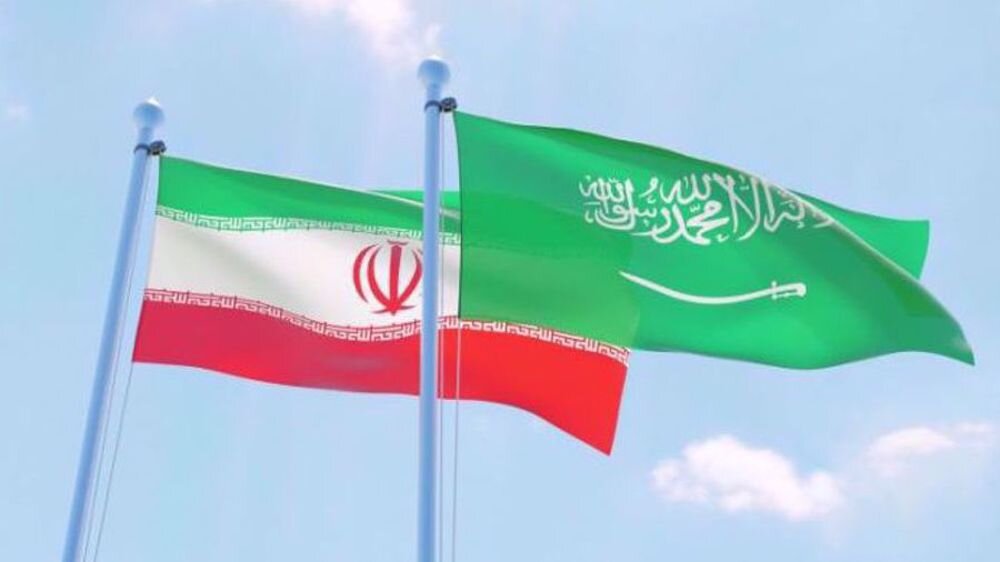
TEHRAN – In a surprise announcement on Friday, Iran and Saudi Arabia announced that they would restore diplomatic ties under a Chinese-brokered deal in a maximum of two months.
The deal was abruptly announced after five days of intensive and secret talks in the Chinese capital Beijing. It was signed by Ali Shamkhani, secretary of Iran’s Supreme National Security Council, Musaad bin Mohammed Al-Aiban, the Saudi National Security Advisor, and Wang Yi, Member of the Political Bureau of the Communist Party of China (CPC) Central Committee and Director of the Foreign Affairs Commission of the CPC Central Committee.
Nour News, a media outlet linked to the Iranian Supreme National Security Council, said hours before the announcement that Shamkhani was conducting “very important negotiations” abroad.
“Admiral Ali Shamkhani, secretary of Iran’s Supreme Security Council, has been busy conducting very important negotiations in a foreign country in recent days,” Nour News said on Twitter. “The imminent announcement of the outcome of these negotiations will result in remarkable developments.”
Shortly after that tweet, official media outlets in Tehran and Riyadh dropped the bombshell by releasing a joint trilateral statement by Iran, Saudi Arabia, and China.
“The three countries announce that an agreement has been reached between the Kingdom of Saudi Arabia and the Islamic Republic of Iran, that includes an agreement to resume diplomatic relations between them and re-open their embassies and missions within a period not exceeding two months, and the agreement includes their affirmation of the respect for the sovereignty of states and the non-interference in internal affairs of states,” the joint statement said.
It added, “They also agreed that the ministers of foreign affairs of both countries shall meet to implement this, arrange for the return of their ambassadors, and discuss means of enhancing bilateral relations.”
The statement further said that Tehran and Riyadh agreed two implement the Security Cooperation Agreement between them, which was signed on 17/4/2001, and the General Agreement for Cooperation in the Fields of Economy, Trade, Investment, Technology, Science, Culture, Sports, and Youth, which was signed on 27/5/1998.
The statement concluded, “The three countries expressed their keenness to exert all efforts towards enhancing regional and international peace and security.”
Saudi Arabia cut diplomatic ties with Iran in 2016 when its embassy was stormed by angry Iranian protestors. Since then, relations between the two countries have been tense. Since April 2021, however, they started talks to patch up their relationship. Five rounds of talks were held in Iraq, with Oman also playing a role in facilitating them.
In the Friday statement, Saudi Arabia and Iran thanked Iraq and Oman for their mediatory efforts.
While Iraq’s mediation was public, China moved ahead with its efforts secretly. Until recently, it was unclear if China played any role in restoring ties between Iran and Saudi Arabia. But the recent visit by Iranian President Ebrahim Raisi to China seems to have greatly contributed to the latest breakthrough.
Mohammad Jamshidi, Deputy Chief of Staff for Political Affairs to the Iranian President, said Friday that the restoration of Iranian-Saudi relations was in part a result of President Raisi’s trip to Beijing.
“Again, Pres. Raisi’s policies succeed. During talks with Pres. Xi in Beijing, constructive ideas for the region were discussed & now they bear fruit. Good neighborly & brotherly policies with Eurasian integration create economic & security benefits free from foreign intervention,” Jamshidi said on Twitter in reaction to the Friday achievement.
Iranian Foreign Minister Hossein Amir Abdollahian also attributed the restoration of ties with Saudi Arabia to the Raisi administration’s Neighborhood Policy, which is meant to improve Iran’s relations with its neighbors.
“The restoration of normal relations between Iran and Saudi Arabia provides great capacities to the two countries, the region, and the Islamic world. The Neighborhood Policy, as the key axis of the thirteenth government’s foreign policy, is moving strongly in the right direction and the diplomatic system is actively looking for more regional steps,” he said on Twitter.”
https://www.tehrantimes.com/news/482710/Iran-Saudi-Arabia-agree-to-restore-diplomatic-ties
China has now brought Saudi Arabia and Iran together, and diplomatic contacts and embassies are to be reopened within 2 months. Then there would probably be nothing with Saudi airfields for an Israeli air strike against Iran. Azerbaijan has now also declared that it is not willing to grant access on its territory for an Israeli military strike.
“Azerbaijan envoy to Israel: You cannot use our airfields to attack Iran
Azerbaijani Ambassador-Designate to Israel Mukhtar Mammadov denied a report by Haaretz that the country has prepared an airfield to assist Israel.”
https://www.jpost.com/international/article-733935
Netanyahu an his suppoerters are now blaming the Bennett-Lapid government and Biden for the Saudi-Irandeal deal:
“Top official blames weakness of Biden, Bennett-Lapid government for Saudi-Iran deal
Official claims talks between Riyadh and Tehran began in 2021 during tenure of short-lived unity coalition when US was working to re-enter nuclear deal; Lapid derides accusation
Bennett and Lapid, on the other hand, have accused Netanyahu’s new right-wing government for this backlash on all fronts:
“Saudi-Iran deal destroys Israel’s defense wall against Iran, Lapid charges
Former defense minister Benny Gantz said that he believes Netanyahu has abandoned the security of Israel and its citizens.”
https://www.jpost.com/middle-east/article-733960
There are revolutionary mass protests in Iran while there alre also mass protests in Israel against the judicial reform, in which millions of Israelis see the end of democracy and IDF reservists are already refusing to work and taking part in the protests, as well as heads of the IDF, Mossad and Shinbeth are openly critizising Netanyahu in open letters and comments and statements, claiming that he and his rightwinged goverment is the real danger für the security of Israel and of Zionism. Also interesting in this context is the following article, which says that the Saudis in order to join the Abraham Accord want the USA to approve a civilian nuclear program, and the promise that US arms deals with SA will not be subsequently withdrawn.
“To normalize with Israel, Saudis want US okay for civil nuclear program — diplomat
Middle East official stresses deal remains ‘far off,’ amid Congressional opposition to boosting defense ties with Riyadh and intensifying Israeli-Palestinian violence”
Apparently, Saudi demands have fallen on deaf ears in Washington and the Biden administration fears that the Saudis might have their own nuclear weapons program, which could trigger a nuclear arms race in the Middle East as Trump already with the Iron Bridge program tried to give the Saudis access to US nuclear technology, droped the Iran deal and killed IRCG chief commander Someini. But the alienation with Biden was already apparent when SA, to Putin’s delight and Biden’s annoyance, did not increase oil production as part of OPEC plus at the time in order to reduce inflation, and even cut it by 2 million barrels. Netanyahu is now threatening a military strike, in the Jerusalem Post even an article warning of a nuclear holocaust and saying it’s time to make a decision about the Iran:
“It’s time for Israel to make a decision about Iran
The would-be Hitlers of Persia have spoken openly about their desire to wipe Israel off the map. In effect, they are seeking to erect an atomic Auschwitz designed to finish what the Nazis began. (…)The writer Michael Freund served as deputy communications director under Prime Minister Benjamin Netanyahu during his first term of office”.
https://www.jpost.com/opinion/article-733874
And Netanyahu accordingly:
“Netanyahu: ‘Horrible nuclear war’ will break out, if Iran isn’t stopped
Netanyahu gave an interview to Iran International who intend on dubbing it into Persian and broadcasting it in Iran.
https://www.jpost.com/middle-east/article-733901
However, most IDF generals and officers know that there is no acute danger of a nuclear Holocaust from Iran, maybe in the future, but that BIbi wants to take this as valve for his plans to abolish democracy, build a autotarian rule, ush the settlements in „Samaria and Judea“, even provoke a new Nakba, wipe out Palestianan towns like Huawara like Sabra, Shatilla or Lidice and push out the Palestians from the Westbank, have a Jordanian solution, Greate Israel, the final dissolution of the two state solution and conquer the state of Israel not by a storm on Capitol Hill and the Knesset, but from within the Knesset with his fascist Smotrich and Iranian style- religious fundamentalist Ben G`vir and to use thsi scenario to let the Israelis rally around the flag. But obv#viously this is not working at the moment. However, most of the Israelis don´t buy this obvious nuclear Holocaust threat at the moment. However, even if the Bibi wants to start a military strike against Iran, it won´t be that easy. Ex-NATO general Domroese jr. thinks that an Israeli military strike would be logistically impossible without the USA. And at the moment it seems unlikely that SA or Azerbaidjan is granting Israel airfields to realize such a military air strike against Iran.
Muddled situation. However: What will the SA- Iran deal bring about? Will there be a ceasefire and the end of the Yemen war? A relaxation in Iraq, Syria and Lebanon? Assad’s return to the Arab League? Diplomatic resumption does not automatically mean the end of all conflicts and different interests. And what will SA do if Iran continues to push uranium enrichment? Or will China find a solution here too?
China itself has a certain interest in stability in the Greater Middle East, as it now wants to connect this area with the Middle East, including Iran and Saudi Arabia, and China via its New Silk Road from Central Asia by the SCO via Pakistan’s CPEC and Afghanistan wants to expand it to Iran and Saudiarabia and the Middle East and would like to see the two parties to forget about their conflict as it can negatively affect oil prices and the world economy, and China itself gets a lot of oil and gas from Iran and Saudi Arabia, although it doesn’t necessarily want an Iranian nuclear power weapon state , but just like North Korea could accept it in an emergency, since Iran positions itself above all against the United States.
In the case of Iran, it can be seen that there was initially a certain amount of euphoria in the Tehran Times about the deal, now in today’s issue again the same article puts it into perspective and is already linked to concrete expectations: „Positive, but with caution“.:
“Positive but with cautionMarch 10, 2023 – 15:37
Iran, Saudi Arabia agree to restore diplomatic ties
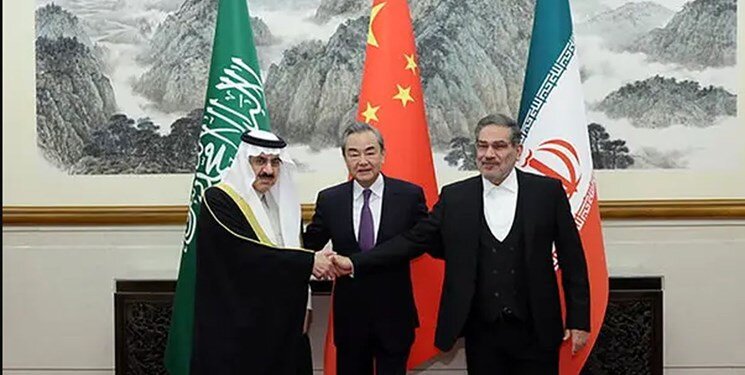
TEHRAN –
(…) Iranian Foreign Minister Hossein Amir Abdollahian also attributed the restoration of ties with Saudi Arabia to the Raisi administration’s Neighborhood Policy, which is meant to improve Iran’s relations with its neighbors.
“The restoration of normal relations between Iran and Saudi Arabia provides great capacities to the two countries, the region, and the Islamic world. The Neighborhood Policy, as the key axis of the thirteenth government’s foreign policy, is moving strongly in the right direction and the diplomatic system is actively looking for more regional steps,” he said on Twitter.
So far, there have been negative reactions from America and Israel towards this agreement, and it seems that they view themselves as the losers in this situation.
However, despite the optimism and hope, caution should be exercised regarding the dimensions and process of this agreement.
The upcoming months and how Riyadh handles issues such as supporting anti-Iran media and the war in Yemen will determine the extent of progress made.“
https://www.tehrantimes.com/news/482710/Positive-but-with-caution
Iran wants to wait and see how Saudi Arabia reacts to anti-Iranian media propaganda and how it acts in Yemen over the next few months. This as two minimum conditions. Does SA support the revolutionary mass protests in Iran or not, yes, like in the Arab Spring, does it see a danger for its own authoritarian rule and maybe even help with its suppression beyond all other Iranian-Saudi/Shiite-Sunni contradictions? Are the militias SA supports in Yemen wanting a ceasefire with the Houthis? At least on the part of the USA, Iran sees an alleged more aggressive new US strategy in Yemen:
“New U.S. strategy in Yemen
By Ali Karbalaei
March 5, 2023 –
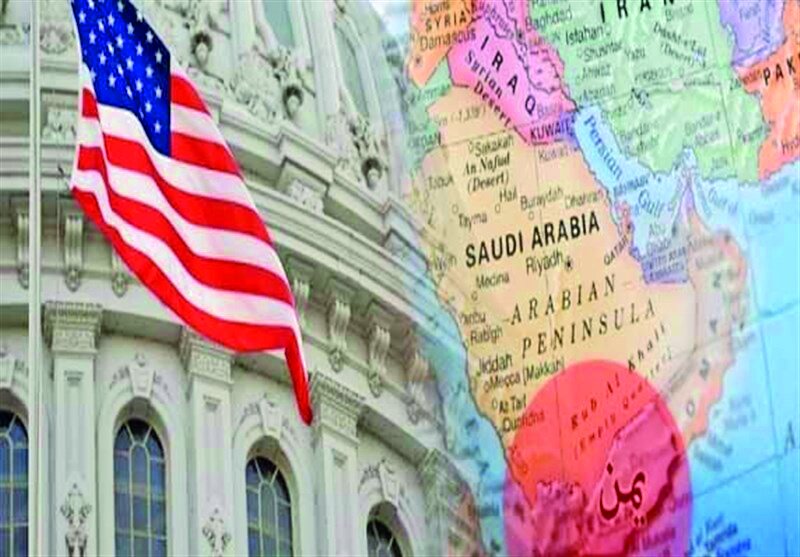
TEHRAN- The United States appears to be pursuing a new policy in Yemen by occupying the country’s natural resources.
This is what the illegal visit of the commander of the U.S. Fifth Fleet and Naval Forces in the U.S. Central Command to the Yemeni governorates of Al-Mahra and Hadhramaut on March 2 strongly suggests.
Yemen has a sufficient amount of oil and natural gas resources for both domestic demand and exports.
And this is something the U.S. and its Western allies are in dire need of getting their hands on amid shortages in the wake of the Ukraine war.
In his latest speech a few days ago, the leader of Yemen’s ruling Ansarallah movement, Abdul-Malik al-Houthi, revealed that Washington had established military bases in the provinces of Hadhramaut and al-Mahra in eastern Yemen.
He added that the commander of the U.S. Fifth Fleet, accompanied by an American diplomat, landed at the headquarters of the illegal U.S.-Saudi military coalition base in al-Mahra.
Vice Admiral Brad Cooper and the U.S. ambassador to the Saudi-led puppet government in southern Aden travelled to the city of al-Ghaydah in Mahra governorate, in a flagrant violation of Yemen’s sovereignty.
According to reports citing well-informed sources, Cooper and the U.S. official Stephen Fagin were accompanied by a delegation of top U.S. military officials at al-Ghaydah airport, which has been turned into a military base for American, British and Israeli forces on the Arabian Sea.
They also held talks with the pro-U.S.-Saudi coalition and self-proclaimed governor Mohammed bin Yasser to discuss “maritime issues”.
Since 2018, the airport has been closed to the people of Mahra and has been occupied by the so-called “Commander of the Coast Guard” with the U.S.-Saudi coalition that has been indiscriminately bombing Yemen since March 2015.
The sources pointed out that the U.S. military visit came after a meeting held by bin Yasser with the U.S. official in the Saudi capital Riyadh last January, in a bid to carry out new missions for the U.S. forces occupying al-Ghaydah airport, under the pretext of “combating smuggling” and “confronting the potential dangers of terrorism.”
The eastern oil-rich Yemeni provinces of Mahra, Hadramout, Shabwa and Marib have recently become the focus of the ambitions of the occupying countries of the U.S., UK and France, with the aim of controlling the sources of oil and gas.
U.S. and European countries intensified their movements in the eastern provinces of Yemen after the escalation of the conflict in Ukraine last year, and have shown great interest in these regions.
The latest developments come as the West faces oil and gas shortages in the wake of its sanctions on the Russian energy sector following the outbreak of the Ukraine war.
Saudi media have confirmed from sources in the U.S. Department of Defense that Washington has retained two CIA military bases in areas under the control of pro-U.S.-Saudi coalition government, including in the city of Mukalla in Hadhramaut governorate.
While the West is claiming that its presence in the region is aimed to deepen bilateral and multilateral maritime cooperation, the evidence on the ground proves quite the opposite.
Yemen considers the presence of foreign forces on its territory as an occupation, and this leads to the question of the reason behind this exceptional concentration of foreign military bases in the country.
Are we are facing a scenario similar to what is happening in northeastern Syria, where U.S. has been plundering the country’s oil to the tune of billions of dollars?
Al-Houthi says the U.S. has been working actively to end the talks between Saudi Arabia and Yemen in Oman intended to end the war.
„The U.S. seeks to obstruct the Omani efforts, which is to distance the coalition from any agreement or understanding, and this is totally unacceptable,“ he said.
Experts say this makes sense as reaching a comprehensive political settlement means an end to the war. And ending the war would require the exit of all foreign forces led by the American and British militaries from the eastern and southern Yemeni coasts. For this reason and other reasons as well, the U.S. and the UK are working to impede the talks and obstruct reaching any political settlement.
Likewise, Yemen’s geographical location is one of the most important in the West Asian region. It has a large front on the Red Sea and has a large gateway to the Gulf of Oman and the Arabian Sea that extends to other regions. The Gulf is what America needs to build military bases and serve its other sinister goals.
The nature of the relations between the western-occupied regions in Yemen, and between Saudi Arabia and the UAE is important as well. The main point here is that the puppet authority in Yemen does not care about the issue of sovereignty.
If the authority put in place by the U.S. and its regional allies had an independent voice, then there would be no occupation, military and naval bases, blockade or plans to seize the country’s natural resources.
If anything, the puppet government is contributing to the violation of Yemen’s territorial integrity and sovereignty.
Analysts have said that the foreign military bases, which have been listed by the leaders of Ansarallah as areas of occupation, will possibly be targeted to create realistic equations.
Others agree that after showing impressive steadfastness in the face of eight years of war, it would be natural for the Yemeni forces to have the ability to target foreign military bases as has been reflected over the years.
With the U.S. putting the brakes on talks in Oman, Sana’a says its military capabilities are growing, and all branches of the armed forces are prepared for the next stage that could open the door to „the option of a broad military operation.“
All of U.S. President Joe Biden’s boasting about ending support for Saudi military operations in Yemen, and the movement in the U.S. Congress that pushed for an end to military aid to Riyadh has now turned out to be inaccurate, and if anything it was just an effort to deflect the growing global condemnation.
What is happening now in al-Mahra and Hadramout is clear evidence of the ongoing interest of the U.S. in not only its military presence but also the expansion of it, one year after the Ukraine war.
Analysts have pointed out that Saudi Arabia has practically taken full control of al-Mahra in cooperation with the U.S. and local militias, and there are many reports citing Israeli naval cooperation as well, in addition to the U.S. cooperation with the two parties.
Will Yemen turn into Syria? Time will tell.
But judging by the past few years, Yemeni forces have proved capable of confronting threats and turning their chants and slogans into extraordinary retaliatory operations.
“The level of our military capabilities has evolved compared to the beginning of the aggression” al-Houthi warned.
„If we look at the situation today compared to the beginning of the aggression, and to previous years, there is a major difference in the level of Yemeni military capabilities,“ the leader of the Ansarallah movement explained.
https://www.tehrantimes.com/news/482623/New-U-S-strategy-in-Yemen
So will Saudarabia join the US in Yemen or rather go along with Iran’s alleged New Neighborhood Policy, which somewhat resembles Davotoglu’s No Problem policy before Erdogan dropped it. Iran and Saudi Arabia have seen for the time being that they have mutually weakened and harmed each other through their open confrontation. Iran first wants to wait and see how Saudi Arabia reacts specifically to anti-Iranian media propaganda and how it acts in Yemen. This as two minimum conditions. Does SA support the revolutionary mass protests in Iran or not, yes, like in the Arab Spring, does it see a danger for its own authoritarian rule and maybe even help with its suppression beyond all other Iranian-Saudi/Shiite-Sunni contradictions?
First of all, there is a new development in the exile opposition: The Mahsa Charter or as Iran International reports:
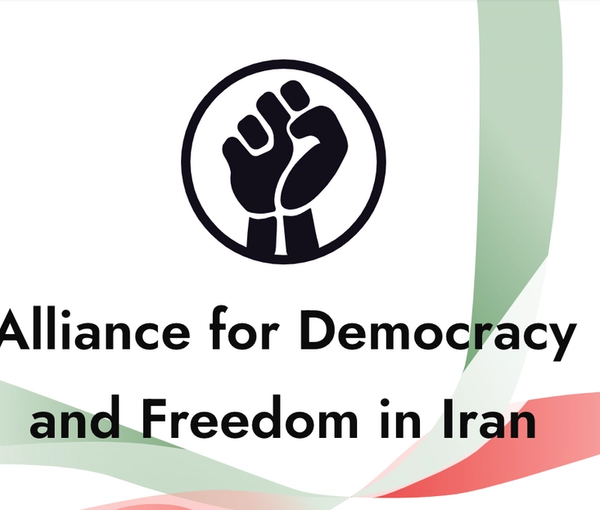
The logo of the Alliance for Democracy and Freedom in Iran
Iran’s United Opposition Figures Release Mahsa Charter
19 hours ago4 minutes
Author: Iran International Newsroom
Prominent Iranian dissident figures, who have recently made an alliance against the Islamic Republic, has issued a Charter of Solidarity and Alliance for Freedom.
The group, which calls itself the Alliance for Democracy and Freedom in Iran, announced its existence in a February event at Georgetown University’s Institute for Women, Peace and Security (GIWPS) — titled ‘The Future of Iran’s Democracy Movement.‘
Exiled Prince Reza Pahlavi, Nobel peace prize laureate Shirin Ebadi and Canada-based activist Hamed Esmaeilion, as well as US-based author, journalist and women’s rights activist Masih Alinejad, actress and activist Nazanin Boniadi and Secretary General of Komala Iranian Kurdish party Abdullah Mohtadi had said that they would release the charter that would lay the foundations for political representation of the aspirations of protesters in Iran and gain support for isolating the Islamic Republic.
The document is also called the Mahsa Charter in reference to “the murder of Mahsa (Jina) Amini and the beginning of the Woman, Life, Freedom revolution,” which has seen the people of Iran continuing to fight for freedom “to break the chains of injustice, discrimination and tyranny.”
Emphasizing that the way to building a free and democratic Iran is to overcome the Islamic Republic regime, they said, “Reaching this ultimate goal necessitates the three elements of unison, organization and relentless continuity in activism.”
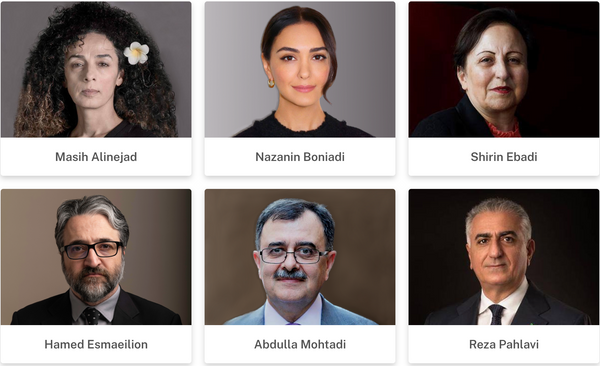
They said the charter relies initially on activities outside of the country, underlining that the isolation of the Islamic government internationally is a first and necessary step for a democratic change.
The charter calls for international pressure on the Islamic Republic to halt all death sentences and to immediately release all political prisoners without condition; expulsion of the regime’s ambassadors and all its dependents by democratic governments and acknowledging the alliance of opposition figures as well as their charter; and facilitating any means necessary to aid the people of Iran.
“Subsequent actions will take place with the participation of activists inside Iran to focus on fair transitional justice, the formation of a council for the transition of power, and the means by which power is transferred to a secular, democratic government,” reads the charter, adding that “The Alliance will introduce actionable initiatives using democratic methods to be implemented at the earliest opportunity in order to bring to fruition the civil action struggles of the people of Iran.”
The members of the alliance have repeatedly said that anyone who accepts the core values of the group is welcome to join them, but until now there had not been a clear explanation for their main values. They enumerated 17 common values for a democratic Iran, noting that the form of the future government will be a secular-democratic system determined through a referendum. “All political and official members of the state shall be elected through a free and democratic election process whereby citizens of all beliefs, ethnicities, gender and sexual orientation be afforded dignity and equal rights before the law.”
The need to maintain the territorial integrity of Iran while accepting diversity in language, ethnicity, religion and culture; and to decentralize power by deferring financial, bureaucratic and policy making affairs to elected provincial, city, and regional administrations is also among the values.
The charter also talks about the formation of an independent organization to supervise elections and the acceptance of domestic and international monitoring of elections, which would result in “a new national constitution through an inclusive and transparent process.” “The new constitution shall adhere to the Universal Declaration of Human Rights in its entirety.”
The charter also mentions the abolition of the death penalty and any corporal punishment and enacting the Convention on the Elimination of All Forms of Discrimination against Women as well as the establishment of an independent judicial system in accordance with international standards. It calls for Justice for all victims of the Islamic Republic through fact finding commissions under the auspices of fair and independent courts including the right to independent legal representation.
One of main points of the charter is the abolition of the Islamic Revolutionary Guards Corp – or the IRGC — and all of its subsidiaries. “The possibility to integrate IRGC elements into other armed forces such as the army may only be possible in the absence of involvement in crimes and based on necessary qualifications,” it said, adding that “The military shall only be responsible to defend the territorial integrity of the country.”
It also called for “cooperation and peaceful relations with all countries in the world, and to cease all interference in the affairs of other countries, and to join the International Criminal Court.” Joining the International Convention on Nuclear Safety and the Financial Action Task Force (FATF) were key values in the charter.
“To overcome the Islamic Republic’s tyranny, all Iranians who are committed to freedom must unite. The courage of the people of Iran and their persistent fight for freedom shall be the bright beacon of hope for our future. Let us stand united in the creation of a free tomorrow,“ the charter concluded.
However, the Alliance for Democracy and Freedom in Iran does not see itself as a government in exile or as a shadow government, or as it describes itself:
„Alliance for Democracy and Freedom in Iran (ADFI) is an alliance of individuals, organizations, political parties and other entities who are committed to the “Mahsa” Charter as a framework for cooperation. The alliance pursues the non-violent overthrow of the Islamic Republic regime and establishment of a secular democracy that serves the will of all Iranian citizens.
What is our purpose?
We aspire to build the foundations of a secular democracy upon which political parties and civil society can be elected by, and serve the will of the people. This process is our common goal to ensure prosperity, freedom, equality and the well being for every Iranian citizen.
Our mission
The ADFI is not a shadow government. We are not the leaders of the Iranian people, but we seek to reflect and pursue their demands. We shall continue this endeavor for as long as our people and our homeland suffer under tyranny and oppression, with the aim of establishing a secular and democratic structure in Iran.“
The Charter of Solidarity and Alliance for Freedom (The Mahsa Charter)
Last updated on March 9, 2023
After the murder of Mahsa (Jina) Amini and the beginning of the Woman, Life, Freedom revolution, the people of Iran continue to fight for freedom and intend to break the chains of injustice, discrimination and tyranny. All of us who bear the scars of the Islamic Republic’s atrocities on our bodies and souls, believe that the way to building a free and democratic Iran is to overcome the Islamic Republic regime. Reaching this ultimate goal necessitates the three elements of unison, organization and relentless continuity in activism.
This charter relies initially on activities outside of the country as a means to facilitate the participation of activists inside the country. We believe that the isolation of the Islamic government internationally, is a first and necessary step to affect democratic change on which basis the following objectives shall be pursued;
- To impose international pressure on the Islamic Republic to halt all death sentences and to immediately release all political prisoners without condition.
- Consultation with democratic governments to expel the ambassadors of the Islamic Republic.
- Consultation with democratic governments to expel all dependents of the Islamic Republic from their respective countries.
- Consultation with democratic governments to support this charter and this Alliance.
- To facilitate any means necessary to aid the people of Iran.
The involvement of these governments shall preclude any interference in the internal affairs, and the will of the people of Iran.
Subsequent actions will take place with the participation of activists inside Iran to focus on fair transitional justice, the formation of a council for the transition of power, and the means by which power is transferred to a secular, democratic government. This agenda requires the participation of all citizens specializing in various fields who will be invited to join committees dedicated to transitioning from the Islamic Republic. The Alliance will introduce actionable initiatives using democratic methods to be implemented at the earliest opportunity in order to bring to fruition, the civil action struggles of the people of Iran.
Common values of the Alliance for changing the Islamic Republic regime to a democratic Iran:
DEMOCRATIC GOVERNANCE
- To determine the form of government by way of a referendum, to establish a secular-democratic system (based on the principle of separation of religion from government) in which all political and official members of the state shall be elected through a free and democratic election process whereby citizens of all beliefs, ethnicities, gender and sexual orientation be afforded dignity and equal rights before the law.
- To maintain the territorial integrity of Iran while accepting diversity in language, ethnicity, religion and culture.
- Decentralization of power by deferring financial, bureaucratic and policy making affairs to elected provincial, city, and regional administrations.
- To establish an independent organization to supervise elections and the acceptance of domestic and international oversight organizations to monitor elections.
- To hold democratic elections to form a Constituent Assembly and to produce a new national constitution through an inclusive and transparent process.
HUMAN RIGHTS AND HUMAN DIGNITY
- Acceptance of and respect for diversity and variety in Iranian society and efforts to remedy historic and current discrimination. To accept the position of native languages based on international Laws and Conventions.
- The new constitution shall adhere to the Universal Declaration of Human Rights in its entirety, and all of the rights and freedoms noted therein.
- To abolish the death penalty and any corporal punishment; banning any and all arbitrary arrests and detentions during the transition, and to join the United Nations Convention Against Torture (UNCAT).
- To join and enact the Convention on the Elimination of All Forms of Discrimination against Women, The Convention on the Rights of Persons with Disabilities (CRPD), and to implement all provisions of the Convention on the Rights of the Child and all other conventions to which Iran is a signatory, but has failed to adhere to, and the adoption of the International Covenant on Civil and Political Rights (ICCPR).
- To join and adopt the International Labour Organization’s conventions on the rights of workers including freedom to assembly and to form organizations, the right to strike and collective bargaining agreements. To ensure the health, security and non-discrimination policies and fair minimum wage guarantees.
JUSTICE
- To support the establishment of an independent judicial system in accordance with international standards.
- Justice for all victims of the Islamic Republic through fact finding commissions under the auspices of fair and independent courts including the right to chosen, independent legal representation.
PEACE AND SECURITY
- The Abolition of the Islamic Revolutionary Guards Corp. and all of its subsidiaries. The possibility to integrate IRGC forces into other armed forces such as the army may only be possible in the absence of involvement in crimes and based on necessary qualifications. The military shall only be responsible to defend the territorial integrity of the country.
- To establish policies of cooperation and peaceful relations with all countries in the world, and to cease all interference in the affairs of other countries, and to join the International Criminal Court. To initiate legal action within the framework of international law to annul any and all unfair treaties that are not in the national interest of Iran that have been entered into with other nations or companies by the Islamic Republic government.
- To join and enact the International Convention on Nuclear Safety.
ENVIRONMENTAL SUSTAINABILITY
- Full compliance with the principles of sustainability and protection of the environment and to join relevant United Nations conventions.
ECONOMIC TRANSPARENCY AND PROSPERITY
- To abolish all economic monopolies and to adhere to international banking and currency exchange standards, and also to facilitate international trade and investment opportunities. To focus on remedial policies and special economic provisions to empower marginalized provinces and regions. Transparency, actionable anti-corruption measures and to join the Financial Action Task Force (FATF).
To overcome the Islamic Republic’s tyranny, all Iranians who are committed to freedom must unite. The courage of the people of Iran and their persistent fight for freedom shall be the bright beacon of hope for our future. Let us stand united in the creation of a free tomorrow.
https://adfiran.com/en/docs/mahsa-charter
Before that, however, there was quite a fierce fighting within the opposition in exile, as supporters of the Shah’s son claimed leadership, agitated against minorities, wanted to see the old Shah dictatorship and monarchy restored and not just a constitutional monarchy or even liberal democracy and, especially since they seemed rather divisive and also used tried-and-tested Savak methods against other opposition figures from the Left and Democrats
„Wednesday, 02/22/2023 / 12:38 p.m
Iranian opposition: Worrying developments
Guest post by Kazem Moussavi
Supporters of the Shah’s regime are attempting to co-opt demonstrations by the Iranian opposition.
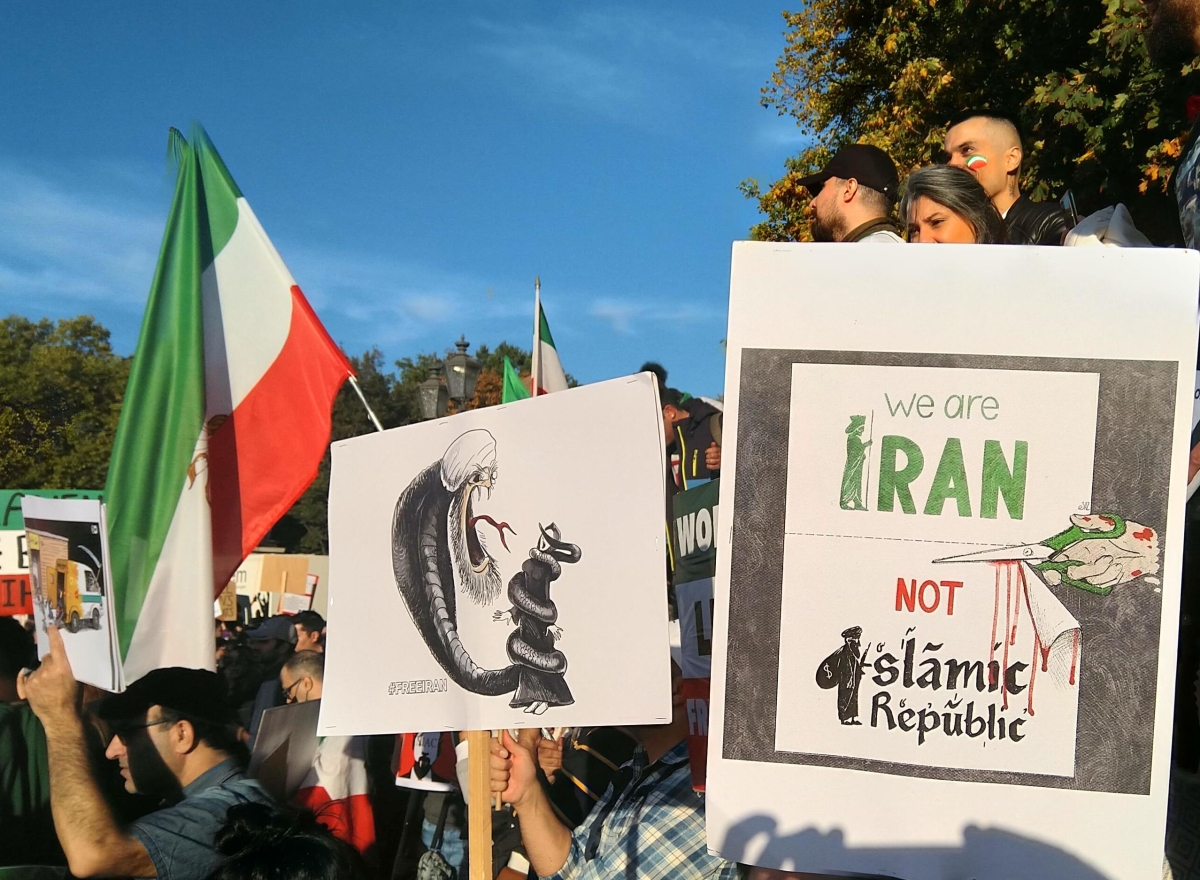
Anti-Regime Protest in Berlin, Picture: Thomas v. der Osten-Sacken
It has been reported and documented that some fanatical supporters of Reza Pahlavi, who are extreme advocates of restoring the former monarchy in Iran, have taken part in anti-regime demonstrations in Brussels, London, Hamburg, Dusseldorf and in the USA, who have attacked and injured forces with banners and slogans against a dictatorial Shah system in Iran. The Iranian Republican H.H. was kicked against his head by a security guard and Pahlavi supporters in Brussels on February 20, 2023.

According to the report, he is still in the hospital with a contusion and a slight concussion (21.2.2023). H.H. cried, echoing the slogan of the student protests in Iran: „Death to the oppressors – be it the Shah or the Supreme Leader!“. The following slogans were chanted at various demonstrations by Pahlavi supporters: „Death to the three: Left-Mullahs-Mojahed!“, a slogan that Pahlavi’s wife also posted on her Instagram story, as well as: „Our leader is Pahlavi, everyone who who doesn’t say is an alien (i.e. not Iranian)!“, „Man, homeland, long live the Shah (Javid Shah)!“. They propagate that „Javid Shah“ is not just a slogan but „our way to victory“, cf. Kayhan London. Recently, at a demonstration in Los Angeles and at others in Brussels and Munich (during the Munich Security Conference 2023), posters showing Parviz Sabeti were shown alongside pictures of Reza Pahlavi. The picture of Sabeti read in Persian: „The nightmare of future terrorists!“. Parviz Sabeti was a senior official of the notorious intelligence service SAVAK, the so-called „Organization for Information and Protection of the Country“ during the Shah’s rule.
Sabeti was head of Department III (domestic intelligence) and in this capacity shared responsibility for the arrests, torture and executions of students critical of the Shah and members of the Fedain and Mujahedin organizations. Parviz Sabeti, who has lived in the US since the Islamist revolution in 1979, took part in a pro-Pahlavi demonstration in LA two weeks ago at which Reza Pahlavi, Massih Alinejad and other allies spoke. Reza Pahlavi and his supporters advocate that Iran’s integrity is not a condition, „but the principle!“. Thus, in the multinational state of Iran after the overthrow of the mullahs, the centralistic hegemony of Persian culture is being striven for directly or indirectly in Tehran, while the current revolution for „Woman Live Freedom“ in a future democratically free Iran does not respond to the populist and nationalist slogan of the Pahlavi -Adherents like „All together for the unity of Iran“، but specifically focuses on pluralism, equality and human rights of the sexual, religious and ethnic minorities in the country.
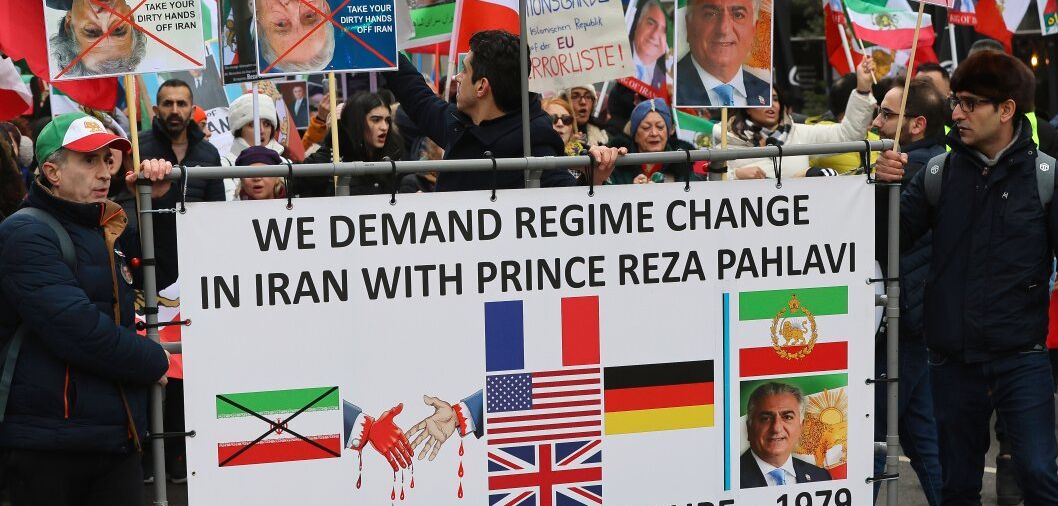
The development of a nationalist ideological current, known as “Pahlavism”, can also be observed among the monarchists. This group, which publishes its theses in Fereydoun magazine, recently founded a party in the United States called The Iran Novin Party or New Iran Party, based on a party founded in 1963 in the Persian Empire, by Hassan Ali Mansur and his friends when the New Iran (Iran Novin) party was formed. „Hassan Ali Mansur was Prime Minister of Iran from 1964 to 1965. He took office at the time of Mohammad Reza Shah’s White Revolution.“ Reza Pahlavi, Massih Alinejad and Nazanin Bonjadi were unofficially invited to the Munich Security Conference (MSC) 2023 as “newly formed opposition representatives”. Her participation in the MSC was massively promoted by the Persian-language Pahlavi-supporting broadcasters IraninternationalTV, Manoto, Voice of America, RadioFarda, as well as Deutsche Welle Persisch and the media of Springer-Verlag in Germany. Bild headlined: „Persia’s last prince wants to overthrow the mullahs“ and the „Welt“ wrote about an interview with Reza Pahlavi: „This is how the exile opposition is planning a new start in Iran“.
It appears that the women’s opposition in Iran, which has been fully focused on dismantling the country’s gender apartheid regime, is now being rendered invisible and weakened, while a cult-like Persian nationalist „opposition“ is being launched from appeasement circles abroad and is supported. Although the protests in Iran do not call for the benefit of specific politicians and organizations in the country and in exile. This worrying political development by the Pahlavi supporters, who claim the anti-regime protests for themselves, has managed in a very short time to create a split between the opponents of the regime and opposition members in exile who previously protested together. This mainly benefits the terrorist regime’s secret services abroad, by favoring them to weaken support for the diaspora protests in order for the regime to crush them in Iran and stay in power.”
Now the Shah’s son seems to have joined the opposition again for the time being and is now using the Mahsa Charter to establish a certain unity. The mullahs will now see to what extent the Mahsa charter will be accepted by the Iranian opposition in Ira and not only in exile and how Saudi Arabia will deal with it financially, on media and diplomatically.
Meanwhile, Iran is trying to replace its old F 15 fleet with Russian aircraft and to deepen military cooperation with Russia beyond drone deliveries:
“Iran finalizes deal to buy Russian Su-35 fighter jets
March 10, 2023
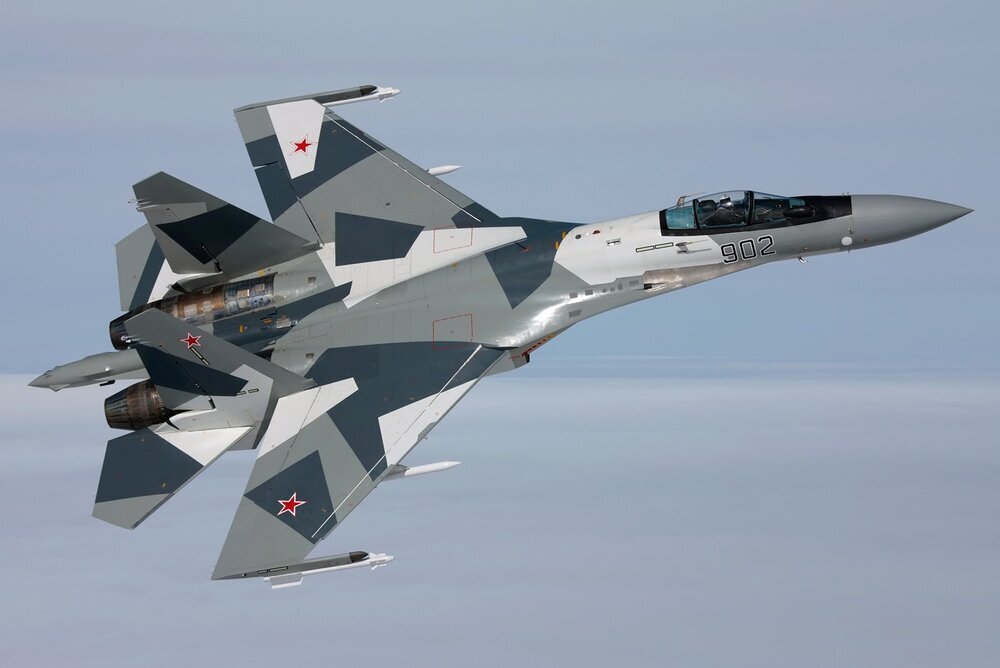
TEHRAN – Iran has finalized a deal with Russia to purchase Russian Sukhoi Su-35 fighter jets, a Russian state-run news outlet reported.
The Russian Sputnik news agency said the information related to the delivery date and the number of the fighters is kept under wraps.
Citing Iran’s mission to the UN in New York, Sputnik said after the end of the Iran-Iraq war in 1988, Iran offered a group of countries its willingness to buy combat aircraft, and Russia said it was ready to sell.
“The mission added that the Su-35 combat aircraft are technically acceptable to Iran, so after October 2020, and the end of Iranian restrictions on purchases of conventional weapons (UN Resolution No. 2231), Iran completed the procedures for its purchase,” the Russian news agency noted.
The Iranian mission to the United Nations did not specify exactly when the deal was completed or how many aircraft Iran would receive from Russia, according to Sputnik, saying, “No details will be published because they are confidential.”
Earlier, the Russian ambassador to Iran, Alexei Dedov, told Sputnik that Moscow and Tehran are working on formulating a new agreement within the framework of Russian-Iranian relations, pointing out that it will be of strategic importance.
The ambassador also noted that it is important for it to be solid and balanced, and to reflect the new realities of bilateral cooperation. „
https://www.tehrantimes.com/news/482751/Iran-finalizes-deal-to-buy-Russian-Su-35-fighter-jets
Furthermore, Tehran reports that in addition to its black gold, it has now also found white gold, one of the largest lithium reserves after Bolivia, Chile and Argentina:
“Huge “white gold” discovery draws spotlight on Iran’s mining industry
March 11, 2023
By Ebrahim Fallahi
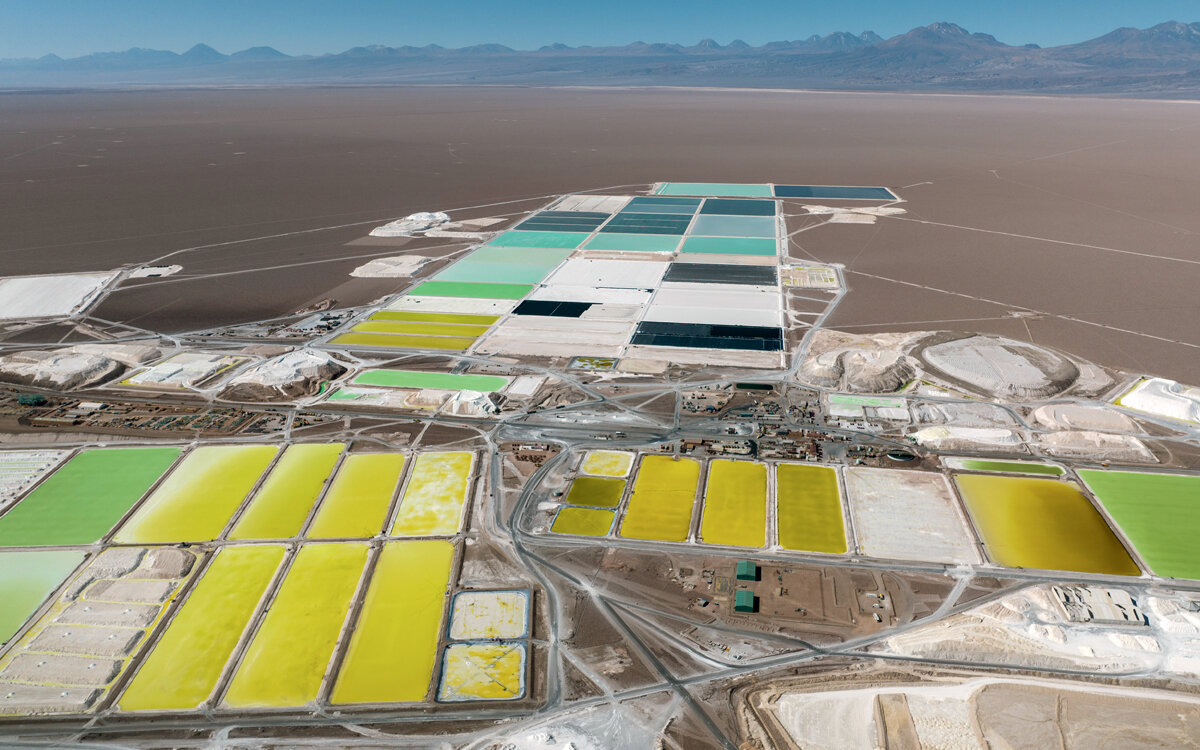
TEHRAN – In late February, Iranian Industry, Mining, and Trade Ministry announced the discovery of one of the largest lithium reserves in the world, an achievement that has put the Islamic Republic’s mining sector on the map of the global mining industry.
According to Iran’s industry officials, the lithium reserve, discovered in western Hamedan Province, holds up to 8.5 million tons of the element, and considering the world’s current discovered lithium reserves, Iran could hold up to 10 percent of the total global reserves.
The U.S. Geological Survey, which maps raw materials deposits across the planet, estimated the world’s total lithium reserves to stand at roughly 89 million tons.
Considering the estimation of the Geological Survey and Mineral Explorations of Iran (GSI), the reserve discovered in the country could be one of the largest lithium ore discoveries in the world and could hugely support Iran’s manufacturing sector and boost its exports.
The White Gold
Lithium, or as the scientists call it the ‘white gold’, is a critical metal for the continent’s ecological transition due to its key role in making batteries for electric vehicles and devices; in other words, lithium is considered one of the most significant elements in the global push for net zero by 2050.
Surging demand for electric vehicles saw lithium prices “skyrocket” by around 550 percent in 2021. The prices rose to as much as $86,170 a ton in November 2022, but have since come down to about $52,000 a ton. Experts believe that the value of the lithium-ion battery market is going to grow to $193.13 billion by 2028, therefore many countries have made it their strategic aim to secure supply.
Iran to extract lithium by 2025
After the discovery of the reserves, the next step for Iran would be to make the necessary preparations for the extraction and processing of the mineral.
Although the Iranian mining industry is considerably advanced and the country is currently mining over 80 different types of minerals, the Islamic Republic could also use the experiences of other countries, especially its big trade partner China for extracting and processing the new mineral.
China has vast experience in extracting lithium since the country has been mining the product in Latin America for several years.
Last week, Mohammad-Hadi Ahmadi, the deputy head of the Ministry of Industry, Mining, and Trade Department in Hamedan, said the country will be able to extract lithium from two newly-discovered lithium deposits in the next two years.
According to Ahmadi, the deposits cover an area of around 11 square kilometers in Qahavand Plain, located more than 50 kilometers to the east of the provincial capital of Hamedan.
He said the discovery of the deposits had taken nearly four years, adding that the Ministry of Industry, Mining, and Trade is currently studying technological capacities existing in two developed countries as part of efforts to start up the mines through a partnership with private investors.
The ministry’s authorities expect more lithium ore deposits could be discovered in Hamedan, a province with vast deposits of clay which is a source of lithium.
Implications for Iran
According to the U.S. Geological Survey, Bolivia, Argentina, and Chile currently have the largest overall lithium reserves in the world and Iran’s 8.5-million-ton lithium deposit would make this newly discovered reserves the fourth-largest in the world.
The discovered lithium reserves can become a new source of revenue for the Iranian government which has been following new strategies to distance the economy from oil.
Detailed studies need to be conducted to determine the exact value of the discovered reserves and the feasibility of extraction; however, the potential economic benefits could be of great importance and a boost to the country’s economy.“
https://www.tehrantimes.com/news/482759/Huge-white-gold-discovery-draws-spotlight-on-Iran-s-mining
Well, it remains to be seen what the concrete effects of the SA-Iran deal will be and whether Saudi Arabia has really already switched camps, as some commentators claim. The question of whether SA will support the mass revolutionary protests in Iran or not, seeing them as a threat to its own authoritarian rule like in the Arab Spring and perhaps even helping Iran to suppress it beyond any other Iranian-Saudi/Shia-Sunni antagonism , Thomas von der Osten-Sacken comments as follows: “The latter is rather unlikely and yes, let’s wait and see what exactly this deal brings. Diplomatic relations existed until 2016. I think the Saudis are sending more of a signal towards Washington. Bin Salman hates the Biden administration”. Maybe they hope for a return of Trump or a similar politican.
Today the SA Iran deal brokered by China is also in the Tehran Times under the headline: WHO won, WHO lost?
https://www.tehrantimes.com/news/482793/Who-won-who-lost
More of a rhetorical question. Everyone won except the USA and Israel, the EU is still left to decide, especially Israel would be the looser, which is also being rubbed in the face of the impending collapse due to its own domestic political polarization and dysfunctionality of the only liberal democracy in the Middle East at a turning point, since Asia, including West Asia, has now become active itself for the first time and the time when the USA was the main player in the Greater Middle East/West Asia is now finally over
At least the deal seems to stabilize the nosedive Iranian currency somewhat:
„Restoration Of Ties With Saudi Boosts Iran’s Currency
https://www.iranintl.com/en/202303119655
The Global Times is particularly keen to promote China’s Ukraine peace plan, and now the SA-Irandeal, as elements and practical application of its Global Security Initiative (GSI) alongside its concurrent Global Development Initiative (GDI), which will officially presented in March on the Boao Forum: China as a harmonious win-win-win bringer of world peace instead of world policeman and global troublemaker USA
„China’s mediation in Saudi-Iran deal to restore ties best practice of GSI, exerting far-reaching influence on other hotspot issues: experts“ https://www.globaltimes.cn/page/202303/1287105.shtml
Israel is now preparing a military strike with the USA. The following message in the Times of Israel now seems to speak for this:
“IAF fighter jets, refuelers hold air drill with US forces, thought to focus on Iran
Two-week exercises simulate ‘strategic strike’ in unfamiliar enemy territory with ‘abundance of anti-aircraft defenses’”
Global Review also interviewed ex-NATO General Domroese Jr. He said that these are routine maneuvers that mean nothing more and should only set up a threat scenario for more diplomacy. But the situation may have changed with the acceleration of Uranium enrichment, Israeli pressure and Iran’s instability. In addition, this is the third maneuver in which the US has provided refueling aircraft in contrast to previous US-Israeli maneuvers, thus wanting to symbolize its eventual logistical support for a military strike. Domroese said that is true, but there is a lack of political will and somehowthere would still be hopes for diplomacy. Especially since the reaction of the Republicans in Congress, who apparently no longer believe in preventing Iran from becoming a nuclear power and are now at best switching to containment, this is possibly an indication that the even softer Democrats and Biden are even less likely to agree support a military strike. It is also significant that the most fanatical Iranhawk of the Republicans( alongside Bolton and Daniel Pipes or Democrat Lieberman) Lindsey Graham, says nothing at all about Iran, but now, in view of the murder of two Americans in Mexico by drug cartels, now proposes a military intervention in Mexico against Mexican drug cartels with the argument that this is the real threat to US national security, like migration and not distant countries like Russia in eastern Ukraine. Apparently he sees the need for intervention and a war on drugs in Mexico rather than a military strike against Iran. In Newsweek, too, Josh Hammer now calls for a US war against the Mexican drug cartels in the style of General Pershing’s Mexico campaign:
„Destroy the Mexican Drug Cartels
As this column noted last week, one straightforward and potentially highly effective policy the Biden administration should announce would be to designate the leading drug cartels as State Department-recognized Foreign Terrorist Organizations. Doing this would allow the U.S. government to use various means to financially suffocate the cartels and deprive them of their funding sources. It would also aid law enforcement. Democrats‚ typical response is that such a formal designation would complicate diplomatic relations with Mexico, but that barely passes the laugh test: Mexico has just as much—if not more—of an interest in cracking down on the cartels as the U.S., but it cannot publicly say so, let alone act upon that interest, due to the cartels‘ successful bribery and corruption of the all-too-venal Mexican government.
Crucially, a formal Foreign Terrorist Organization designation for the leading cartels, such as Sinaloa and Jalisco, would also permit the U.S. to go even further.
Consider the fact that, as recently as 2021, 625 U.S. citizens were abducted in Mexico. Far too many did not come home, as their families failed to pay ransom and the abductees were thus killed. If an Islamic jihadist outfit were responsible for such atrocities on this scale, on an annual basis, Congress would pass a bipartisan authorization to use military force and the U.S. would not hesitate to declare all-out war. After 9/11, the U.S. waged war upon al-Qaeda; but for some reason, with hundreds of citizen kidnappings, far too many murders, and an unfathomable number of Americans now dropping dead from cartel-supplied fentanyl poison, bipartisan elites cite concerns about diplomatic niceties and say our hands are tied.
Nonsense. Our hands are not tied.
There is even some precedent. From 1910 to 1919, the Mexican Border War unfolded in a series of military engagements along the border. After Pancho Villa’s infamous attack on Columbus, New Mexico, in 1916, decorated U.S. Army General John J. Pershing launched the „Punitive Expedition“ (or the „Pancho Villa Expedition“) into northern Mexico. It was only partially successful, but the U.S. Army did manage to kill Villa’s two top lieutenants.
It is now time for another „Punitive Expedition“ into northern Mexico. With cartel violence, drug peddling, and the sheer invasion of illegal aliens at the border the worst they have ever been, the U.S. has little choice but to affirmatively act. We should first seek to obtain the Mexican government’s permission to engage in a limited operation to hunt down and kill top cartel leaders, but this is one such mission where America must go alone if need be. The direct effect on virtually all facets of American life is far too galling for this to go on much longer. It is time to rain hell on the cartels, stopping their illegal alien smuggling, fentanyl-peddling chemical warfare, thuggery, brutality, and corruption once and for all.
The American ruling class would currently have us believe that „democracy,“ and the fate of the Western world more generally, is somehow now on the line in the hinterlands of eastern Ukraine. Suffice it to say that is not the case. But what is the case is that an increasingly failed, corrupt narco-state on our southern border refuses to do anything about some of the world’s most vicious transnational criminal rings, which also happen to control large swaths of the border. It is past time to focus in earnest on extirpating America’s massive problem south of the border.
https://www.newsweek.com/destroy-mexican-drug-cartels-opinion-1786808
Conversely, following the reception of two Iranian warships in Lula, Brazil, there are now calls in the USA to revive the Monroe Doctrine
„Iranian Warships Docked In Brazil Bring Out The Monroe Doctrine“
https://www.iranintl.com/en/202303080343
The ever-closer cooperation between Iran and Venezuela is now also viewed critically:
“Khamenei Book Unveiled In Venezuela To Spread Influence”
https://www.iranintl.com/en/202303113442
But these are individual voices. It is also interesting that many Republicans are now arguing that Iran’s nuclear weapons are not actually the problem, but, as in North Korea, „only“ the carrier systems, the ICBMs, which could reach the USA (Europe and Israel´s security therefore seems to be given a shit) and their prevention and abolishment of development.
.
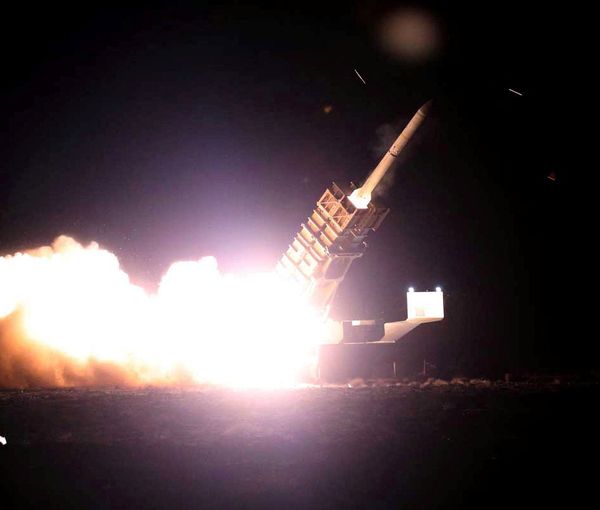
An Iranian missile launch during military drills in February 2023
Republicans Have Lost Hope For Nuclear Containment Of Iran
Friday, 03/10/20233 minutes
Author: Arash Aalaei
As Iran inches closer to military grade uranium enrichment, the question is what the Biden administration can actually do to reverse that?
“They are so far along now, I am not sure at this point they are stoppable,” said Senator John Thune (R-SD) on the sidelines of the Senate weekly bipartisan luncheon on Tuesday.
Being the Whip for the Republican Party in the Senate, he is known to be articulate and measured in his response but when asked about Biden administration policy on Iran, Senator Thune did not mince words.
“A lot of things should have been done earlier [by the Biden administration]. I think like a lot of other national security issues, this administration has been too late to the game and in many cases, they turned a blind eye or a deaf ear to the challenges they face out there,” he said.
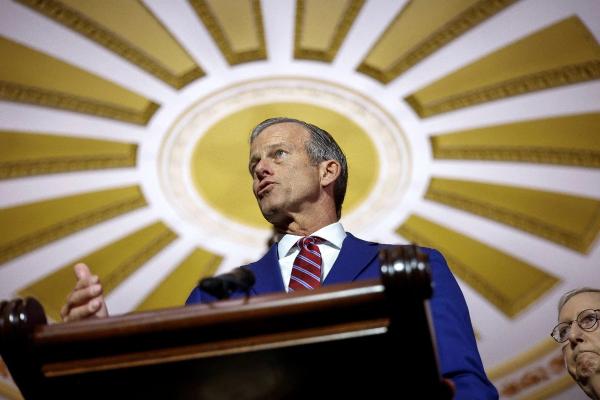
Sen. John Thune, Republican Party Whip
Democrats in the Senate have been dismissive about the news of the near weapons grade enrichment by the clerical regime. Asked if Iran’s ability to enrich uranium at 84% purity concerns him, Senator Bernie Sander said it is does but did not elaborate.
Other democratic senators in US Capitol hallways this week were not so eager to talk about it. ”I think we made a big mistake during the previous administration by pulling out of the nuclear deal with Iran,” said Senator Tom Carper (D-DE). “If we remained in that deal, we would not be in this situation.”
Former President Donald Trump pulled out of the Joint Comprehensive Plan of Action (JCPOA) almost five years ago and the some Democrats have been sticking to some version of Senator Carper’s sentiments ever since. It sounds like an excuse and it might be a good one for the domestic audience, but it’s not a strategy, nor is it a policy.
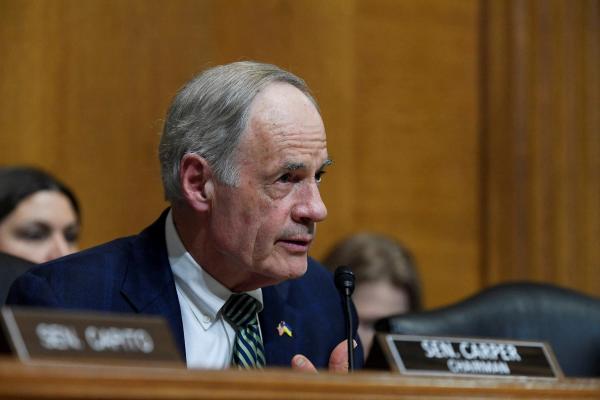
Sen. Tom Carper (D-DE)
The fact is that Iran’s gradual progress in enriching ever higher than what was agreed in the JCPOA has seriously worried the West and regional countries such as Israel and oil-producing Arab countries in Iran’s neighborhood..
South Korean President Yoon Suk-yeol surprised Americans in January when he said that if the US does not deploy back its tactical nukes to the peninsula, South Korea can “acquire its own nukes”.
Coincidentally, Saudi’s energy minister Prince Abuldaziz bin Salman on the same date told a group of attendees at a mining and industry conference in Riyadh that Saudi Arabia is planning to enrich its domestic stockpile of uranium to ensure that it will be able to “complete the entire fuel cycle.”
Enriching uranium to weapons grade is one thing, putting it in a warhead attached to a ballistic missile that is capable of delivering it to medium and long range targets in a matter of minutes, is another thing.
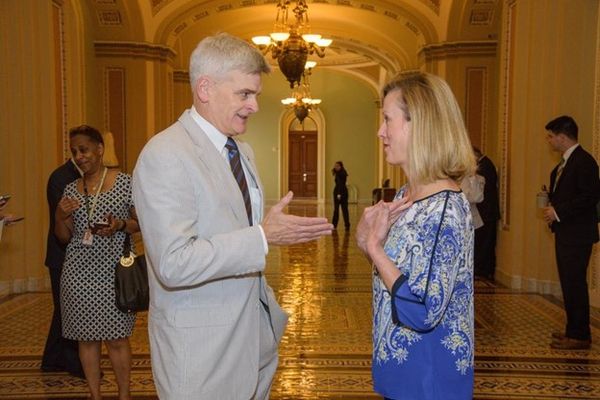
Senator Bill Cassidy (R-LA)
When asked if the US can realistically slow the Iranian ICBM delivery for nukes, Senator Bill Cassidy told Iran International: “I don’t know if they can stop the formation of a bomb, maybe the need is to stop them from being able to deliver it.”
Stopping Iran from its march towards weapons grade enrichment “exceeds what I know as to our capabilities,” he added.
That means the Republicans believe Iran’s nuclear program is anything but contained. If Iran moves to 90% enrichment capacity, then the million dollar question remains: who can stop the likes of Saudis and South Koreans from going down the same path?
https://www.iranintl.com/en/202303100562
Netanyahu, on the other hand, already sees the red line as a „threshold nuclear Iran“. Therefore US and Israeli interests still seem to be apart. A regime change in Iran would change the situation abruptly. Be it Iran as part of the New Silk Road, which just became a member of the SCO and two days later the unrest broke out, be it that a free Iran would be pro-Western again, that the escalation in the Greater Middle East of Syria, Lebanon, Iraq, Yemen with all those dead and refugees would be ended overnight, that the nuclear threat to Israel, Europe and maybe the US and the support for terrorism would be gone overnight. But at the moment there is no news of further major mass protests in Iran’s cities. The question of whether the amnesty and repression of the mullahs had a divisive effect. Thomas von der Osten-Sacken said that the protests would start again by the Newroz festival at the latest, also in Baluchistan, but it’s more the Kurdish and Baluchi minorities. It will be crucial that the majority Iranian society in the Iranian-dominated cities now advances the mass protests to the point of regime change, although the question still remains unanswered as to how they are to counteract repression or a direct takeover of power by the Iranian Revolutionary Guards and paralyze them. Even if the opposition in exile has now taken a significant step with the Mahsa Charter, the opposition that is dominant in Iran must also come to an agreement and step up the fight.
Otherwise, this actually revolutionary movement remains despite of its theoretical goals, just a rebellion due to a lack of majority Iranian mass support and is not breaking the power of the Revolutionary Guards. Without a regime change, there will also be the question of whether there will be a nuclear arms race among the former non-nuclear states and an extensive dissolution of the non-proliferation treaty, yes, South Korea and Saudi Arabia have already announced under Yong and MBS that they can imagine their own nuclear weapons, Erdogan-Turkey and Al Sissi-Egypt are likely to follow next, and Trump already wanted to deliver nuclear technology to Saudi Arabia through the Iron Bridge program, as a congressional committee later revealed after a whistleblower’s report.
Nuclear proliferation under Biden, Putin and Xi , fake news and the future of East Asia
Can a nuclear-armed Iran be deterred and is he a rational actor?